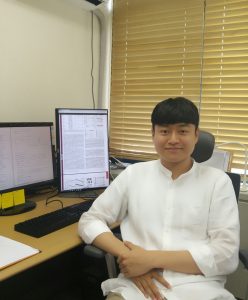August 8, 2017
A doctoral student of the research group headed by Professor Jae Kyoung Kim develops a mathematical model of biological processes to better understand the dynamics of biochemical reaction networks and pathways in living organisms.
The award recognizes and supports outstanding doctoral students who conduct original and innovative research.
One of the doctoral students working under the guidance of Professor Jae Kyoung Kim in the Department of Mathematical Sciences, KAIST, received the Global Ph.D. Fellowships 2017, highly competitive research awards jointly hosted by the Ministry of Education (MOE) of Korea and the National Research Foundation (NRF) of Korea.
First presented to graduate students throughout the nation in 2011, MOE and NRF have selected annually doctoral students with a record of distinguished academic achievements and sponsored their research projects to help the students grow as an independent researcher. A total of 200 students nationwide were chosen for the research grants this year.
Daewook Kim, in his second year of an integrated Ph.D. program, has been studying mathematical biology that involves in employing mathematical techniques and computational tools to explain and predict the diversity and complexity of biological systems.
With his research topic entitled “The Development of a Mathematical Model of Human Circadian Rhythm for Developing New Drugs,” Daewook will receive for two years, beginning August 2017, a tuition scholarship of KRW 10 million (USD 9,000) and a research funding of KRW 20 million (USD 18,000). This financial aid can be extended up to three more years pending the review results of his research after the initial two years.
Our biological clock, a circadian rhythm, regulates the periodicity (usually a 24-hour cycle) of our various behaviors and physiological phenomena. For example, the rhythm causes us to feel “sleepy” or “more alert” at certain points of the day. Circadian rhythms also control eating cycles, metabolism, body temperature, brain wave activity, hormone release, regulation of glucose and insulin levels, and cell regeneration.
The circadian clock is located in the tiny region of suprachiasmatic nuclei (SCN) in the hypothalamus of the brain. Containing about 20,000 nerve cells, the SCN acts as a “master clock” that coordinates all other secondary or peripheral circadian clocks throughout the body to be in synch. Therefore, lesions of the SCN results in the loss of behavioral, endocrinological, and physiological circadian rhythms.
There have been studies showing that genetic, environmental, and behavioral factors can influence disruptions in circadian rhythms. The disruption of our biological clock, circadian misalignment, has been identified to increase the risk of serious diseases like cancer, metabolic syndrome, and cardiovascular complications.
“Many researchers have explored ways to restore disrupted circadian rhythms, but the complexity of biochemical reactions behind the production of circadian rhythms, high risks and costs associated with clinical trials, and the lengthy process of new drug development have stalled the efforts to come up with a solution,” said Professor Kim.
“However, in recent years, we are seeing some meaningful progress coming from the application of mathematics to biology, and my student’s work represents just that,” he added.
Using differential equations, Daewook constructed a mathematical model of human circadian rhythms to create an optimal experimental design for the assessment of new drugs, to test their efficacy under various conditions, and to predict customized drug dosage for individual patients.
“I am very thankful to my adviser who has inspired me to venture out into this field. I will continue to work as hard as I can to make our department proud,” Daewook expressed his gratitude for winning the award.
“Eventually, I hope to contribute to the development of new medicines that will benefit many people, particularly for those suffering from intractable and rare diseases.”
Daewook Kim, a Ph.D. candidate in the Department of Mathematical Sciences, KAIST


